If not managed systematically, agency operations may become chaotic, which can lead to frustrated clients, overspend on projects, timelines being missed and delivery of lower quality work. Neither the agency nor the client wants to experience this. In the worst case scenario these factors may also cause major burnout of staff and ultimately impact the agency’s performance and reputation.
To avoid these pitfalls, it's essential for agencies to leverage the right agency management system to manage their operations efficiently. The right agency management software solution can streamline workflows, improve resource scheduling and time tracking, and ensure that project timelines and budgets stay on track.
By using purpose-built agency software for project planning and project tracking, agencies can maintain transparency, optimize team productivity, and deliver higher-quality work. Ultimately, investing in the right agency management software not only helps prevent operational chaos but also fosters a healthier work environment and stronger client relationships, safeguarding the agency's reputation in the long run.
But not all agencies operate in the same way, and therefore not all tools suit all agencies, so let’s dive a little deeper.

What to look for in an agency management system
Centralizing your agency’s information and processes is important for seamless reporting and maintaining general visibility into all aspects of your agency's operations. From managing your agency’s resources and projects to handling sales, CRM, and finances, having a unified system can transform the way you and your team work together.
Modern agency management systems go beyond simple project management - they offer robust features that connect to your financial systems, integrate with other essential software, and even leverage AI and language learning models to enhance efficiency.
Key features of the best agency management software platforms
1. Project management
This centralizes project tasks, timelines, and budgets, ensuring clear communication, streamlined workflow management, and better oversight. With the right agency management software, digital and marketing agencies can streamline operations, deliver projects on time, and maintain profitability.
2. Client management
Sales and CRM tool sets help with organizing communications, tracking deals, and offering insights into client needs. This helps creative and marketing agencies maintain strong relationships, manage their sales pipeline effectively, and ensure a steady flow of new business.
3. Collaboration tools
Imagine bringing sales, delivery, and finance teams together in one platform, where they can communicate with one another, and being able to manage the entire project lifecycle from the one place? This tool kit ensures everyone stays aligned on projects and client work. The best agency management systems are set up to enhance teamwork and keep all teams and clients on the same page.
4. Reporting and analytics
The right agency management software can provide real-time data, enabling digital marketing agencies to make informed, data-driven decisions confidently and help with resource planning. By offering key metrics instantly, these tools can predict next steps and monitor the health of your agency without waiting for end-of-month reports. This should help ensure that your business decisions are timely and based on accurate insights.
5. Integration capabilities
Integration capabilities are crucial for agency management and workflow automation, as no tool will be the perfect solution. Your existing agency management software is still going to need to talk to your chosen agency management system, and you want to be able to connect them easily. Your ultimate goal is to create a seamless workflow and eliminate data silos from one tool to another.
By integrating platforms like project management, pipeline management, CRM, financial management, and communication tools, digital and marketing agencies can automate data transfer, reduce manual errors, and ensure that all departments have access to the same up-to-date information.

Top 5 agency management software platforms for digital and marketing agencies
1. Productive
Productive.io is an all-in-one agency management software that offers a range of features for resource management, managing projects, tasks, employees, and finances — in short, everything an agency does on a day-to-day basis. One of Productive's best features is its reporting and financial forecasting. You can visualize and forecast key metrics such as revenue, profit margins, and employee utilization for informed decision-making.

Key features
Project management:
Productive includes multiple layouts for organizing your project progress. For example, with the Workload view, you can balance team workloads by viewing task distribution across employees and projects (others include Kanban, Gantt, Calendar, List, and more). Go granular on tasks with milestones, to-dos, subtasks, and dependencies, and build custom automations to make your workflows more efficient.
Resource planning:
Schedule your employees according to availability, including holidays and time off. Book upcoming work with placeholders or plan ahead with tentative bookings. Productive also provides utilization insights and forecasting for guiding allocation and hiring decisions.
Financial management:
Track your billable hours by managing and invoicing budgets of various types, including hourly, fixed-price, and retainer. Then, get real-time visibility into your budget burn, revenue, and profit margins, or forecast them to anticipate project risks. Build reports with templates (or create them from scratch) and share them with key project stakeholders.
Pros
- Provides the functionalities of multiple tools in a single platform to reduce agency tech stack and streamline workflows.
- Offers robust reporting with insights from various data sources (time tracking, scheduling, budgeting, etc.).
- Provides additional platform-wide features, such as no-code Automations, AI, and a flexible Permission Builder.
- Integrates with various agency tools, including Slack, Google Calendar, Xero, QuickBooks, HubSpot, Outlook, BambooHR, and more.
Cons
- No free version of the platform, though there's a 14-day free trial you can check out.
- Integrates well with other tools but is at its best when all features are utilized, including budgeting, resourcing, time tracking, and project management.
Pricing
Productive has four subscription plans, including Essential at $9/month and Professional at $24/month, billed yearly. The Essential Plan is great for getting started with your budgeting, project & task management, and time tracking. In contrast, the Professional Plan offers more advanced reporting, budgeting, invoicing integrations, and more. To get the most out of Productive, you can choose the Ultimate or Enterprise plans, available at a custom price.
Best for
Productive helps agencies of all shapes and sizes gain better control over their business operations and finances.
2. Scoro
Scoro is a comprehensive agency management software platform that offers a wide range of resource management tools to manage projects, finances, and resources. Scoro’s standout feature is its customizable dashboard, which provides a centralized view of all your key metrics, from project statuses to financial KPIs, enabling better decision-making and streamlined operations.

Key Features
Dashboard:
Scoro’s customizable dashboard allows you to track KPIs, project progress, and financial performance in one place. You can create your own views with widgets to monitor metrics like revenue, utilization, and resource availability.
Project management:
Manage the entire customer project lifecycle in Scoro, from quotes to invoices. The platform includes tools like Gantt charts for planning timelines and budget burn visualizations to track project profitability in real time.
Reporting:
Scoro provides over 50 report templates that cover various aspects of your business, including productivity, revenue, and sales. These reports offer real-time insights to help you keep your agency on track and profitable.
Pros
- Combines multiple agency management systems into one platform, reducing the need for additional software.
- Highly customizable dashboard and reporting tools offer real-time insights across various business metrics.
- Strong integration capabilities with other tools, enhancing workflow efficiency.
Cons
- The platform may have a steep learning curve due to its extensive feature set.
- Pricing could be on the higher side for smaller agencies.
Pricing
Scoro offers four subscription plans:
- Essential: $19 per user per month
- Standard: $29 per user per month
- Pro: $49 per user per month
- Ultimate: Custom pricing available on request. A 14-day free trial is also available to explore the platform's features.
Best for
Scoro is ideal for agencies of all sizes looking for an all-in-one solution to manage their projects, finances, and resources while gaining real-time insights to drive profitability.
3. Teamwork.com
Teamwork.com is often described as a cloud based project management tool, but one that has been built to serve companies that do client work. It powers over 6,000 digital and marketing agencies globally, and does a lot more these days than just project management. Their highlight feature is the customizable workflows that your team can set up the way they prefer to work and get very ‘nitty gritty’ in the way tasks and projects are managed.

Key Features
Project management:
The detail and the capabilities of Teamwork.com’s task management system is the best of the bunch. In addition to collaboration features, you can also utilize task fields, making overarching project management and oversight a breeze.
Time and resource management:
Teamwork's resource management includes time tracking and insights, and it also reports back on under-utilization of staff, to ensure that the agency employees are working on the right things at the right time.
Workflows, templates and task automation:
With task scheduling and AI support, your team will no longer waste time on repetitive tasks. They’ll be able to set up templates and automated workflows and save hours of time on each project.
Pros
- Very easy to use without a steep learning curve.
- The project management platform is based on a Kanban board, and Gantt chart that most team members are already familiar with.
- The integration opportunities are broad and it’s rather easy to bring all your tools under the Teamwork ‘umbrella’ and get your team onboarded quickly.
- Offers a free plan for teams who are just getting started with an agency management platform and workflows.
Cons
- Teamwork.com can get very expensive for small organizations.
- Due to customized workflows the setup of the system can be a time consuming process.
Pricing
- Free: for teams under 5 users, who are trialling the software with basic functionality
- Deliver: $10.99 per user per month (minimum 3 users)
- Grow: $19 per user per month (minimum 5 users)
- Pro: $54.99 per user per month (minimum 5 users)
- Enterpriser: Custom pricing available on request. A 14-day free trial is also available to explore the platform's features.
Best for
Teamwork.com suits agencies who are sized medium to large. As migrating large workflows to a new agency management software can be daunting. Teamwork can save your team many hours a week, not only in project management, but also resourcing management, task management, contract management, and collaboration, as well as integrations.
4. Streamtime
Streamtime is a project management platform designed specifically for creative businesses like design agencies, digital and marketing agencies, consultancies, architects and more. It offers an intuitive interface that balances project management and team wellbeing by tracking not only tasks but also time spent on each activity without overcomplicating the process. It's the only tool that helps agencies manage their staff's work-life balance.
Streamtime also supports Never Not Creative, a non-profit focused on improving mental wellbeing for the creative, media and marketing industry

Key Features
Task and time tracking:
The Streamtime To Do screen lets teams manage their own work or have it scheduled for them. Every time they drag a 'To Do' to 'Done' it automatically logs the time on a job to give real-time updates on job progress without a timesheet in sight.
Scheduling:
Scheduling is as easy as dragging, dropping and re-assigning. It’s easy to make quick changes to your team schedules while in planning meetings or as new requests come in.
Reporting and insights:
Streamtime recently released a new, comprehensive reporting feature that allows you to create your own reports from any data set in the product, add your own formulas and keep reports updated with live data.
Pros
- User-friendly interface that reduces the complexity of managing tasks and time.
- Automated timesheets eliminates the need for manual time tracking and makes it easier to monitor productivity.
- Unlike some tools that encourage non-stop productivity, Streamtime emphasizes a balanced workload by preventing over-scheduling and burnout. You can use it’s happiness feature to track happiness levels across your team.
- Integrates seamlessly with popular tools like Xero, Quickbooks, and Zapier.
Cons
- For agencies reliant on more than 50% of their revenue coming from services or expenses marked up with third party suppliers, expense management can be onerous (although we hear they’re working on it).
- Streamtime’s customization options are more limited compared to other platforms, which may pose a challenge for teams needing highly tailored workflows.
Pricing
Streamtime offers flexible pricing plans that cater to different team sizes and needs. The Streamtime team will package a fixed price for your needs, and the value and the pain points that its solving. Pricing after your first year can rise or fall depending on your success with the product and as a business.
Best for
Ideal for creative businesses searching for better usability, leading to more accurate data and better decisions.
5. Workamajig
Workamajig is an all-encompassing, fully integrated project management tool designed specifically for creative teams. It provides a full suite of project management tools, including CRM, resource management, and financing tools. If you’re looking for an easy-to-use yet in-depth tool, Workamajig is for you.

Key Features:
Project management & reporting:
Whether it’s budgets, timelines, or reports, Workamajig’s real-time dashboard keeps your finger on the pulse, ensuring nothing falls through the cracks. Using Workamajig’s many project templates, you can kickstart your projects and keep them well-documented throughout. You can also easily create and export detailed reports to keep stakeholders happy and well-informed.
Resource & task management:
Workamajig’s resourcing tool gives you all the information you need to know on precisely what resources you need now and in the future. You can view workloads by week or day and filter by department, office, or role. Workamjig’s resourcing tool keeps your team members happy and engaged as it allows you to see who has too little or too much work so that you can balance accordingly.
Sales CRM:
Workamajig brings all your client data into one easy-to-use software. The sales dashboard gives you full pipeline visibility, showing you opportunities by stage, status, and probability of closing. By providing accurate estimates, Workamajig helps you focus on your winning prospects.
Finance & accounting:
Thousands of agencies use Workamajig as their financial health nerve center due to its robust accounting package. Workamajig clearly shows you which clients are your most profitable, and where you can improve your margins. When it comes to billing, Workamajig’s flexible reports allow you to bill by time, materials, fixed fee, retainer, or media.
Pros
- With everything under one roof, you can say goodbye to finicky spreadsheets and trying to coordinate multiple software platforms.
- Workamajig is cloud-based and fully integrated, making it a highly convenient option.
- Workamajig was created with creative agencies in mind, which means it’s easy to adapt to, and all the tools are useful and relevant.
Cons
- Takes time to fully learn and utilize all features.
- The interface may feel overwhelming, especially for teams unfamiliar with project management software.
- As with any fully integrated system, setting up workflows and reports to match agency needs can be time-consuming, but Workamajig does offer full training and support for all accounts, at no additional cost.
Pricing
Workamajig pricing is all-inclusive and includes project management, resource management, complete accounting, and more. View their pricing page here.
Best for
Marketing and creative agencies that are looking for a user-friendly tool that gets everything (but literally everything) under one roof.

How to choose the right agency management software platform for you
When making a decision about which agency management software tool to use, the following considerations will help you find the best agency management system to meet your needs - one that not only meets your current requirements but also supports your agency’s growth and success in the future.
Agency size
Different agency management software platforms cater to various marketing agency sizes, so it's essential to choose one that fits your specific needs. Small agencies might prefer simpler, cost-effective solutions, while larger agencies may require more robust platforms with advanced features to handle complex workflows.
Specific needs
Evaluate what your agency specifically needs, whether it's powerful CRM capabilities, advanced project management features, or detailed finance management and workflow automation. Understanding your primary requirements will help you select a tool that aligns with your operational goals.
Budget
It's important to balance the tool’s cost with your budget while ensuring it meets your essential needs. Be mindful of subscription fees, potential add-ons, and whether the tool provides enough value to justify the investment.
User reviews and trial periods
Consider exploring customer reviews, case studies, or trial versions to assess how well the tool fits with your agency's workflow. This can provide valuable insights into the user experience, potential challenges, and overall effectiveness of the tool.
Scalability and usability
Choose an agency management software platform that is intuitive and easy for your team to use, reducing onboarding time and promoting adoption. The tool should also be scalable, capable of growing with your agency as your team expands, and your needs evolve.

In conclusion
Choosing the right agency management tool can significantly assist with your project planning and resource scheduling, as well as streamline your operations, enhance team collaboration, and improve your client relationship management. By considering your agency’s size, specific needs, budget, and scalability, you can find a solution that fits perfectly and grows with you.
The right agency management software tool will not only centralize your processes but also provide the visibility and insights needed to drive efficiency and success as your agency evolves. Start with trials or demos of recommended tools to find the best fit and set your agency up for long-term success.
Frequently asked questions
1. What other agency project management software platforms are available?
In this blog we have outlined the best agency management software platforms currently available but there are certainly others on the market that can help agencies manage their automated workflows, budget management, resource scheduling and agency tasks.
Other project management tools include:
- Monday.com
- Asana
- Trello
- Wrike
- ClickUp
- Basecamp
- Workamajig
- FunctionFox
- Mavenlink
- Zoho Projects
- Float
- Jira
- ActiveCollab
- Smartsheet
- Forecast
These agency management tools offer various features tailored to project management, tasks, teams, and resources within an agency.
2. Will an agency management system help with resource management?
Yes, an agency management system can significantly improve resource management, as well as time tracking, financial management, project budgets and workflow management.
When you use an agency management system you'll get a real-time view of resource allocation, helping agencies track availability, capacity, and workloads across teams. With features like time tracking, project timelines, and workload distribution, project managers can make informed decisions about assigning tasks and balancing workloads. This level of oversight prevents overallocation or underutilization of team members, ensuring that projects stay on track and within scope.
Popular project management software platforms often include forecasting tools that help agencies predict future resource needs based on upcoming projects and deadlines. This allows for proactive resource planning, reducing bottlenecks and ensuring that the right people are available at the right time. By integrating resource management with other areas like project management and financial tracking, agency professionals can easily streamline operations, optimize performance, and ultimately increase efficiency.
3. Are there any free agency management software platforms?
While no team collaboration tools are completely free, you'll find that most agency software platforms offer a free trial for a limited period during which time you can determine whether they meet your requirements.
It's important to note that while these platforms offer a free trial, they often limit features like advanced reporting, automation, or integrations. To experience what the platforms have to offer, project managers will have to upgrade from a free trial to a paid subscription.
4. How does BugHerd integrate with agency management tools?
BugHerd integrates seamlessly with various digital and marketing agency tools to enhance project workflows, particularly in managing feedback, bug tracking, and client collaboration. Here are some common ways BugHerd integrates with agency management tools:
Task syncing
BugHerd can sync tasks and feedback directly into project management tools like Trello, Asana, or monday.com. This allows teams to manage and track client feedback or website bugs alongside other project tasks in a centralized task board, making it easy to assign, prioritize, and resolve issues within the agency's existing workflow.
Collaboration
By integrating with tools like Slack or Microsoft Teams, BugHerd enables real-time collaboration between teams, clients, and stakeholders. Notifications about new feedback or bugs are shared directly within the team's communication channels, improving response times and keeping everyone in the loop.
Project visibility
When integrated with tools like Jira or Wrike, BugHerd’s visual feedback is turned into actionable tasks that are automatically linked to the larger project plan. This ensures that every bug or issue raised on a website is visible to the project team and is aligned with the project timelines and milestones.
These integrations help agencies streamline their workflows by bringing client feedback and issue tracking directly into their existing management tools, reducing friction between development, design, and client collaboration.
View all BugHerd integrations here.
5. How can agency management tools improve client communication
Many tools offer built-in CRM features that allow agencies to track communications, manage client requests, and provide status updates. Integration with client collaboration platforms also ensures transparency and reduces miscommunication, improving client relationships.
6. Can agency management tools help with financial tracking and invoicing?
Yes, many agency management platforms include built in time tracking and financial management features like budget tracking, invoicing, and expense monitoring. These tools help agencies keep projects within budget, track billable hours, and generate invoices automatically, simplifying the financial management process.
7. What kind of support and training is available for agency management software?
Most agency software platforms offer support through various channels such as email, live chat, and phone. Many also provide extensive training resources like tutorials, webinars, and knowledge bases to help teams get onboarded quickly and effectively.
8. Is it easy to scale agency management software as my agency grows?
Yes, most agency software platforms are designed to scale with your business. As your team grows and project complexity increases, you can typically upgrade your plan or add more features to accommodate larger workflows, teams, and client bases.




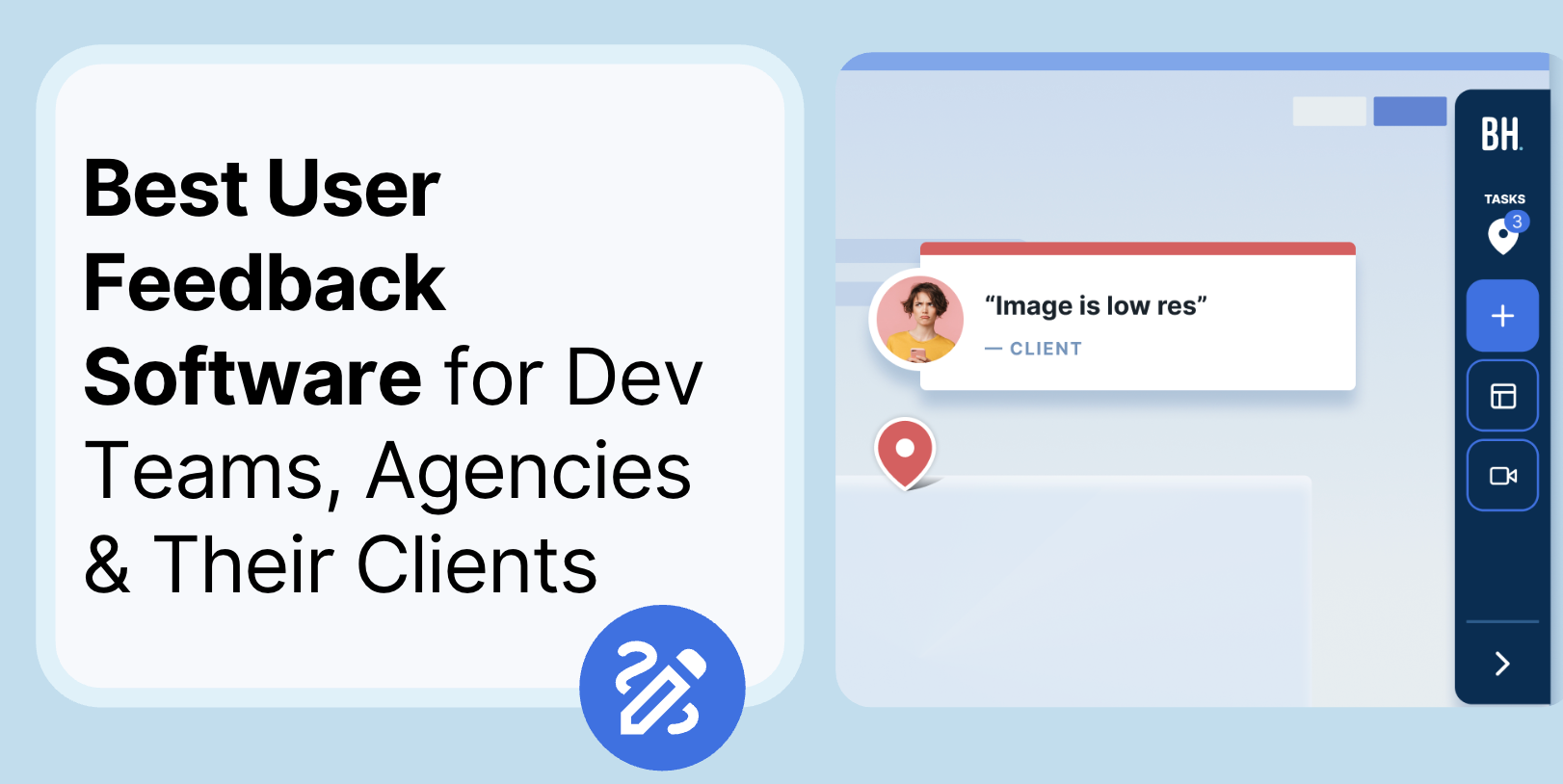


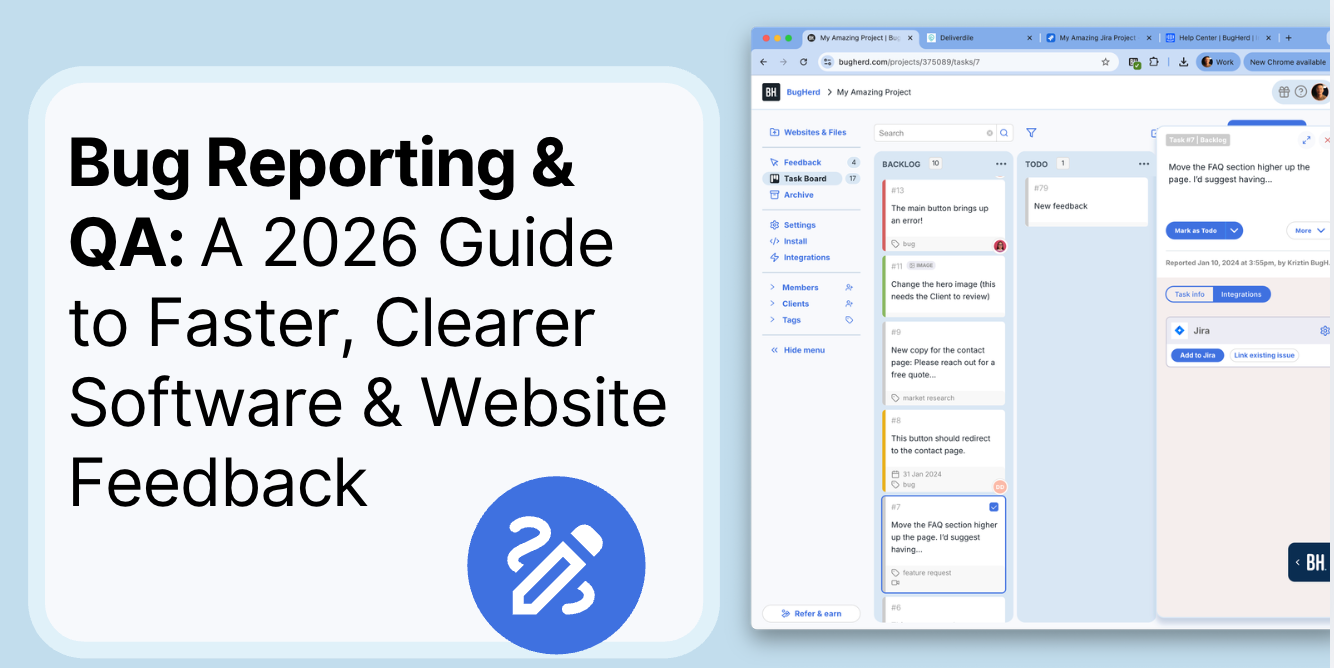

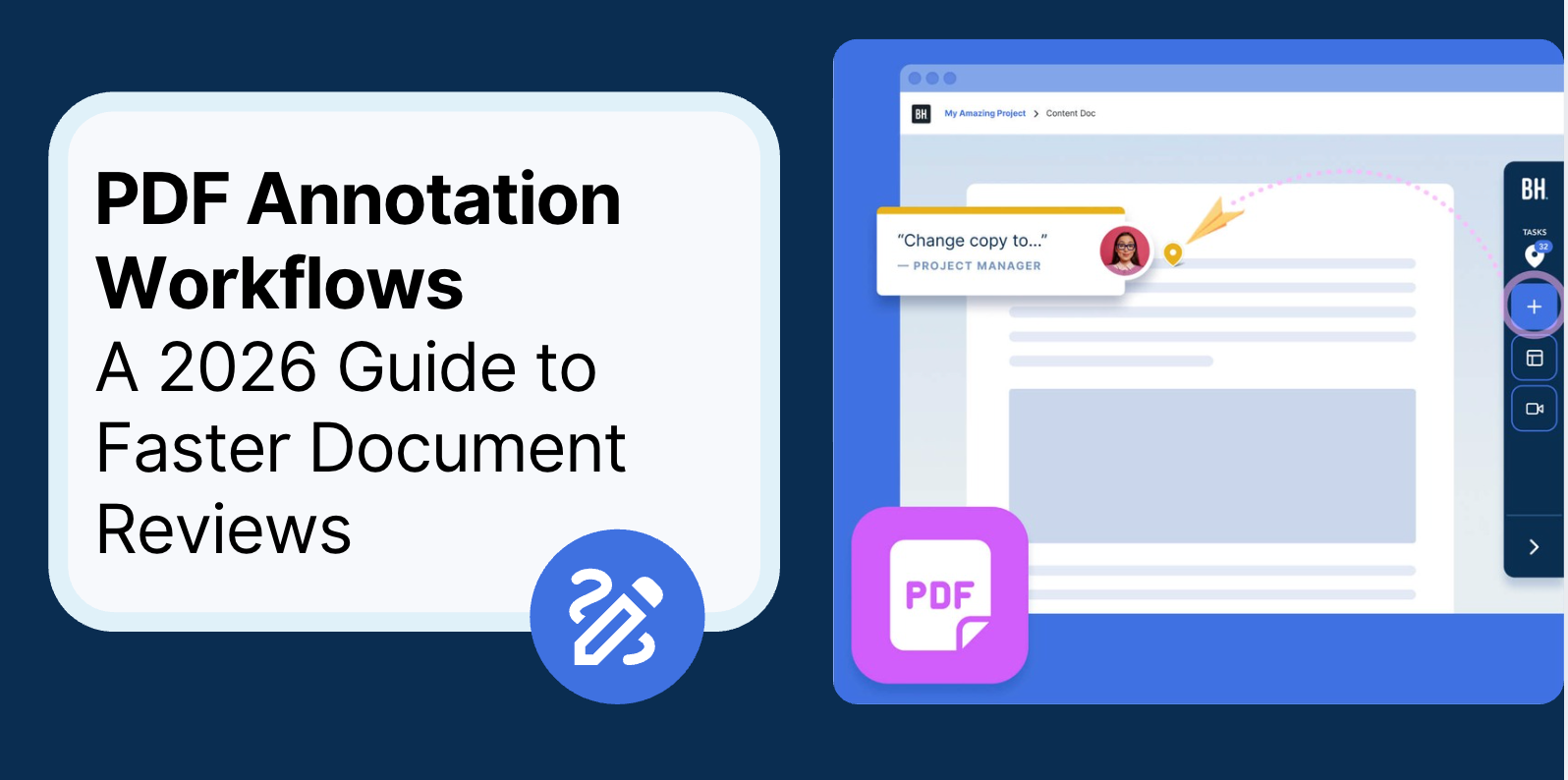
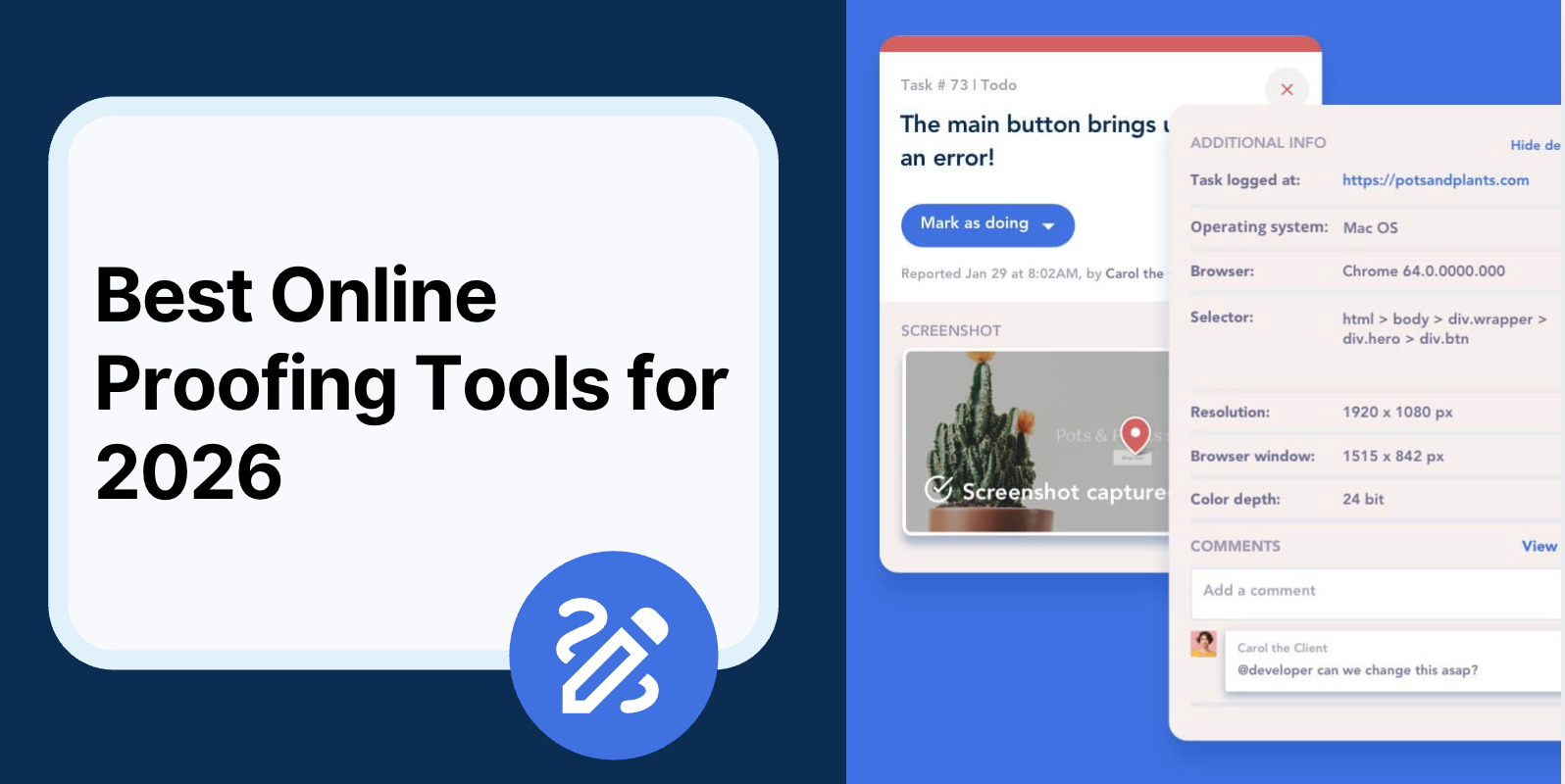
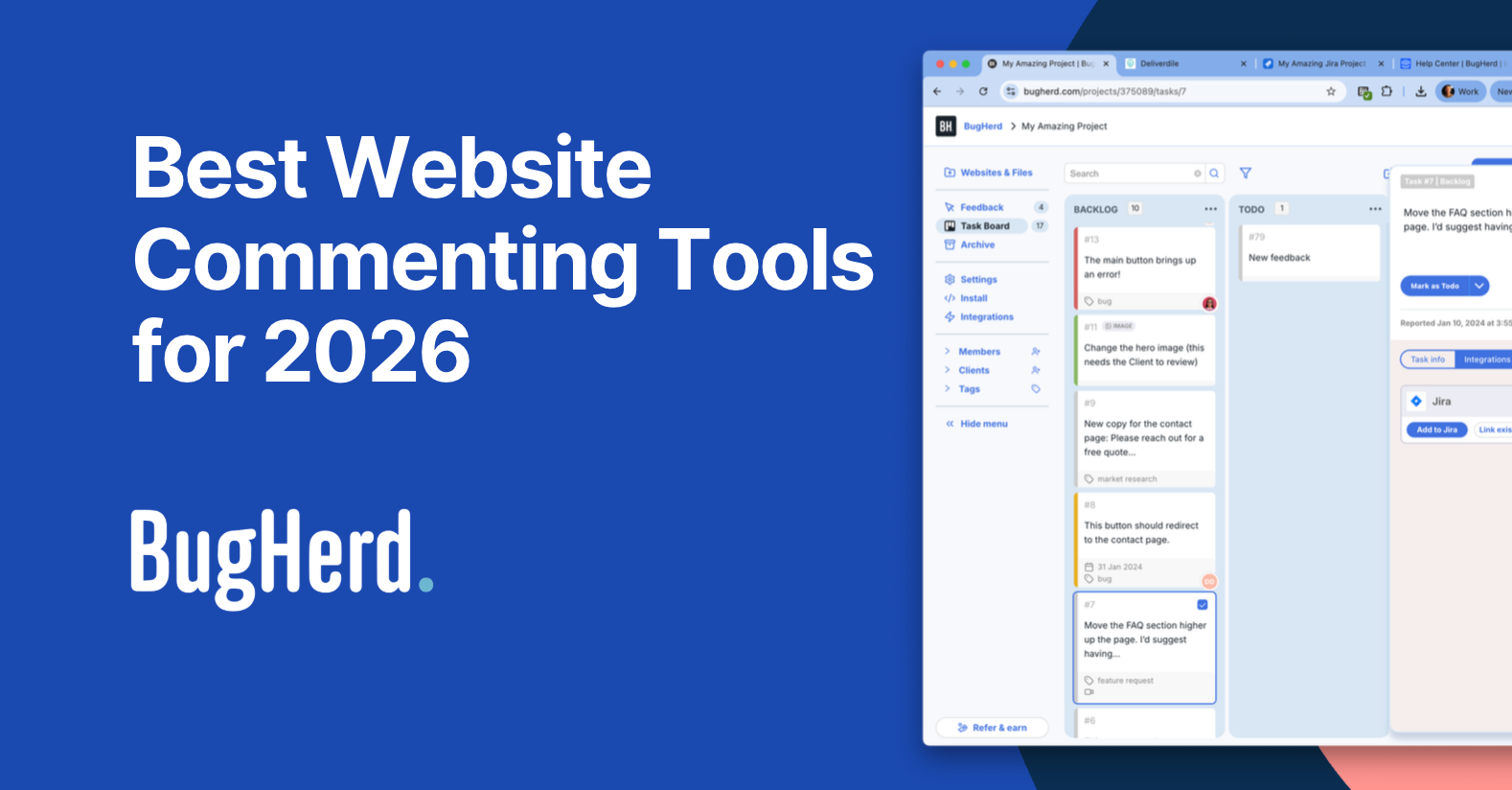
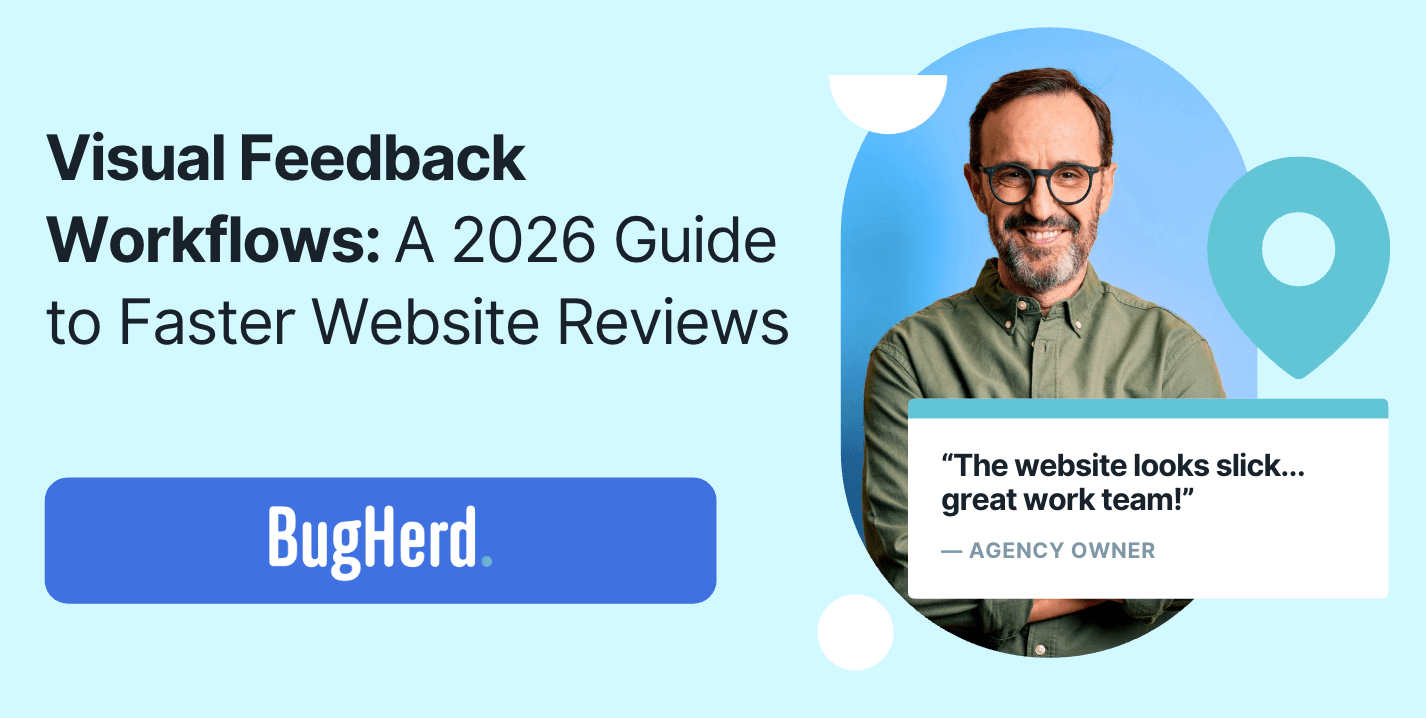



But don't just take our word for it.
BugHerd is loved by 10,000+ companies,
350,000+ users across 172 countries.
4.8/5
4.7/5
4.5/5
5/5
8.7/10
Sam Duncan 📱📏 🌱
@SamWPaquet
"@bugherd where have you been all my life??
We just migrated our bug tracking over from Asana and have at least halved our software testing time🪳👏📈. "
Ashley Groenveld
Project Manager
“I use BugHerd all day every day. It has sped up our implementation tenfold.”
Sasha Shevelev
Webcoda Co-founder
"Before Bugherd, clients would try to send screenshots with scribbles we couldn't decipher or dozens of emails with issues we were often unable to recreate."
Mark B
Developer
“A no-brainer purchase for any agency or development team.”
Kate L
Director of Operations
"Vital tool for our digital marketing agency.”
Paul Tegall
Delivery Manager
"Loving BugHerd! It's making collecting feedback from non-tech users so much easier."
Daniel Billingham
Senior Product Designer
“The ideal feedback and collaboration tool that supports the needs of clients, designers, project managers, and developers.”
Chris S
CEO & Creative Director
“Our clients LOVE it”
Emily VonSydow
Web Development Director
“BugHerd probably saves us
at least 3-4hrs per week.”